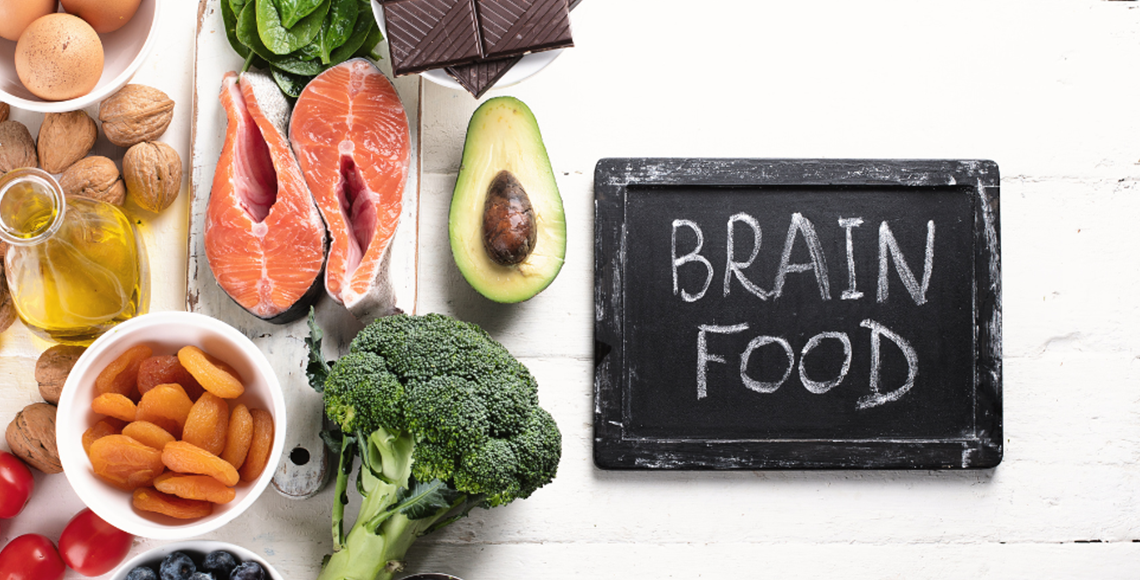Healthy Brain Food for Women
It’s been said that “you are what you eat.” Although this may not be entirely true, the foods you eat can affect your brain health, which can in turn affect your memory and behavior. That’s why it’s so important to eat healthy brain food.
According to a 2018 study, two-thirds of dementia patients are women. Women also account for 60 percent of caregivers either caring for a friend or loved one with the disease. Women in their 60s are also more than twice as likely to develop dementia than they are breast cancer. And because the early signs and symptoms of dementia are often confused with menopause, it’s important to pay attention to intuition when something doesn’t seem right. Early intervention can help with dementia prevention and management.1
How Food can Impact Brain Health
Some research has shown that food can play a role in brain health.2 Here are the best brain foods for dementia prevention:
Leafy Greens – Greens such as spinach, kale, broccoli, and collards are rich in nutrients that support brain health—folate, beta carotene, vitamin K, and lutein. Research shows eating a diet rich in these dark greens may help slow the development of memory problems with age.2
Fatty fish – Much of your brain is made from fat, and half of that fat is omega-3 fatty acids. So, it should come as no surprise that eating foods rich in omega-3 fatty acids, such as salmon, tuna, mackerel, trout, herring, and sardines, can help preserve brain health.3
Several studies have shown that eating fish rich in omega-3 fatty acids two to three times a week can help with dementia prevention.3
Walnuts – Don’t like fish? You can get omega-3s in supplement form. Or you can eat a handful of walnuts. Walnuts are a great source not only of healthy fat, but also of protein—both of which are good for brain health. A study done at UCLA connected eating walnuts with higher scores on cognitive tests.2
Berries – Blueberries, raspberries, strawberries, and blackberries all contain flavonoids. These compounds give berries their color, and they can help with Alzheimer’s prevention. One study done at Harvard found that women who ate at least two servings of berries a week delayed memory problems by up to two-and-a-half years.2
Healthy gut foods – Some of the most cutting-edge research on food and Alzheimer’s prevention has been done on the microbiome. Your microbiome is the colony of trillions of microorganisms—bacteria, fungi, viruses, and parasites—that live in your gut.2
The newest research shows that the specific microorganisms in your gut may affect risk for cognitive problems. To help with dementia prevention, eat foods that populate your gut with the right organisms. Prebiotic foods help create the right environment in your gut for beneficial microorganisms to grow. Go for prebiotic foods in their raw form, such as garlic, leeks, asparagus, onions, bananas, artichokes, and seaweed. Probiotics help supply the micro-organisms themselves. These foods include yogurt with live cultures, kefir, sauerkraut, pickled vegetables, kimchi, and kombucha tea.2
Green tea – This popular drink contains several ingredients that make it a good beverage for brain health. For one, it has caffeine, which improves memory and focus. It also contains an amino acid called L-theanine, which increases a brain chemical that lowers anxiety and promotes relaxation. And the polyphenols and antioxidants in green tea help with dementia prevention and reduce the risk for Parkinson’s Disease.2
Water – Your brain is made up of 85 percent water, so it requires adequate hydration to function properly. Drinking enough water is important for maintaining energy for your workout routine, too. To keep your body and your mind working as they should, aim for four to eight cups of water a day.2
Train Your Brain to Prefer Good-for-You Foods
There’s a reason we’re supposed to fill more than half our plates with fruits and veggies as part of a healthy eating plan. A diet rich in fruits, vegetables, and lean proteins has been linked to a lower risk of breast cancer in some studies, according to the American Cancer Society.4 If you’re a steak and potatoes kinda gal, a plate of greens, beans and other healthy foods might just kill your appetite. But a study out of the Jean Mayer USDA Human Nutrition Research Center on Aging at Tufts University and Massachusetts General Hospital recently found that you can indeed train your brain to prefer healthy foods over diet destroyers—it just may take about six months.5
The Boston-area scientists looked at overweight and obese men and women, some of whom were also enrolled in a weight loss program designed by Tufts University. All the participants underwent magnetic resonance imaging (MRI) brain scans at the beginning of the study and again after six months. And the six-months-in brain scans of those who were in the weight loss program revealed changes in their brains’ reward centers—specifically, increased sensitivity to healthy, lower-calorie foods and decreased sensitivity to unhealthy, higher-calorie foods. In other words, the participants who had faithfully followed a healthy eating plan for six months had changed their brains to prefer healthy foods over unhealthy foods. Simply by sticking with their diets.
That’s the good news—and the bad news, right? Because sticking with your weight loss diet—making your weight loss goals as important as just about everything else in your life—is unspeakably tough. Especially for women. With all we juggle in our busy lives, we women have a hard time staying focused on ourselves. We’re easily distracted by family and work and friendship responsibilities—anything incoming. The secret is knowing this about ourselves and planning for it.
Here are some health tips on how to stick with your healthy eating plan:
Keep reminders of your goals
Keep reminders of your health and fitness relationship goals everywhere you can. Plaster something motivational on your computer, iPad, or iPhone screensaver or homepage. It could be a quote or picture or anything that snaps you out of your stress trance and right back into your end fitness relationship goal. Hot tip: Whip out that piece of clothing that you’ll fit into 5 or 10 pounds from now and keep it front and center in your closet. Use it as visual weight loss encouragement.
Relax when eating
Eat everything sitting down. This will force you to enjoy every bite and avoid eating mindlessly, which is the enemy of a weight loss eating plan.
Stay Active
Distract yourself. Come up with a list of distractions you can turn to when a craving strikes. These could be things like call a friend, check the news online, or go get the mail.
Stay in touch with your motivations
Remind yourself of your reasons why. Always stay in touch with the reason why you’re working so hard to lose weight and get healthier. Whether it’s to be able to hike that gorgeous mountain on vacation, or to travel and feel comfortable, or to be here to enjoy your kids and grandkids, or to get off your medications, or to glow with energy—it doesn’t matter what your why is, just that you remember and honor it. Constantly.
For the best brain food, follow the Curves Nutrition Program. As a member of Curves, you can add our Nutrition & Weight Management program to your membership, which helps keep your body in tip–top shape for your full body workout. The healthy meal plan and educational series offered at Curves will help you develop healthy habits for life. During your one-on-one sessions with your Curves Coach, you can discuss foods you should eat and lifestyle changes you can make for optimal health and wellbeing.
Sources:
- What is Alzheimer’s Disease? Symptoms & Causes – Alzheimer’s Association
- Foods linked to better brainpower – Harvard Health
- Omega-3 Fatty Acids and their Role in Central Nervous System – A Review – PubMed
- Tips for Eating Healthier – American Cancer Society
- Training Your Brain to Prefer Healthy Foods – Tufts Now








